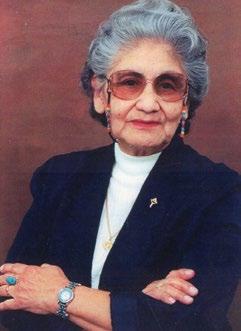
2 minute read
Women in UM History
from The Contact 3-6-24
by okumc
A Trailblazing Elder: Lois Glory-Neal’s Legacy in Oklahoma and the United Methodist Church
Born on July 22, 1931, in Tahlequah, Oklahoma, the capital of the Cherokee Nation, Lois Glory-Neal has dedicated her life to faith and service.
Her upbringing within the Cherokee community deeply influenced her journey, shaping her into a leader who championed inclusivity and fought for the recognition of Native American voices within the United Methodist Church.
Glory-Neal’s path to ordained ministry began in 1979, a later-in-life call she described as a “sacred, intimate call.” In 1984, she earned a Bachelor of Arts degree from Oklahoma City University, followed by a Master of Divinity from Saint Paul School of Theology in 1988 –a remarkable accomplishment she achieved at the age of 58.
However, Glory-Neal’s greatest challenge lay ahead. As the first Native American woman to seek full connection as an ordained elder in the UMC, she faced a path with no clear precedent. Overcoming significant hurdles, she received her ordination in 1988, breaking new ground for Native American women within the church.
Glory-Neal’s pioneering spirit extended beyond her ordination. In 1992, she became the first female Native American district superintendent, further shattering glass ceilings and inspiring others to follow her path. Her unwavering dedication to her faith also manifested in various leadership roles, including lay leader, president of United Methodist Women at local and district levels, and the first Native American representative on the General Commission on the Status and Role of Women.
Glory-Neal’s legacy continues to resonate within the UMC, particularly in Oklahoma, her home state. She paved the way for increased inclusivity and representation of Native American voices in the church, challenging established structures and advocating for cultural sensitivity. Her life story serves as a powerful testament to perseverance and the importance of fighting for equality.

Glory-Neal’s impact is evident in initiatives like the Oklahoma Conference of the UMC’s continued commitment to Native American ministries and partnerships with local communities. Her legacy serves as a reminder of the ongoing need for inclusivity and the ongoing journey toward a more diverse and representative church.
This story was written - and then fact-checked - with the help of AI. (A first draft was filled with many inaccuracies.) This experiment honors the recent AI training at OKUMC.

